| Srl | Item |
| 1 |
ID:
084626
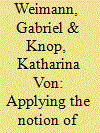

|
|
|
|
|
| Publication |
2008.
|
| Summary/Abstract |
The growing presence of modern terrorism on the Internet is at the nexus of two key trends: the democratization of communications driven by user-generated content on the Internet; and the growing awareness of modern terrorists of the potential of the Internet for their purposes. How best can the terrorists' use and abuse of the Internet be countered? As this article argues, the answer to violent radicalization on the Internet lies not in censorship of the Internet, but in a more sophisticated and complicated strategy, relying on the theoretical notion of "noise" in communication process theory.
|
|
|
|
|
|
|
|
|
|
|
|
|
|
|
|
| 2 |
ID:
084627
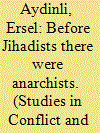

|
|
|
|
|
| Publication |
2008.
|
| Summary/Abstract |
With the wave of violent jihadist activities in recent years, the world's attention has shifted away from a traditional prioritizing of state forms of formal violence toward one focusing on an apparently "new" phenomenon of transnational violence. Yet transnational violence itself is not a new phenomenon; it in fact precedes international, state-centric violence. For reasons related to gaps or defects within the state system or to surges in the capacities of individuals and societies, transnational violence has periodically made attempts to regain its primary position. Prior to the violent jihadists, the last of these efforts was that of the late-nineteenth-century Anarchists. This article looks at the dynamics of the Anarchists's failure as part of a transnational violence continuum, using a framework based on their autonomy, representation, and influence. The results provide an historical example against which future studies about the current episode of transnational violence may be compared.
|
|
|
|
|
|
|
|
|
|
|
|
|
|
|
|
| 3 |
ID:
084628
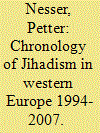

|
|
|
|
|
| Publication |
2008.
|
| Summary/Abstract |
Considering Europe's long history of terrorist violence by separatist, leftist and rightwing groups, terrorism by militant Sunni Islamists has until recently been a marginal phenomenon. However, empirical data presented in this chronology suggests it constitutes a growing and increasingly lethal threat, and a worrisome trend in the context of increased tensions between the Muslim world and the West in the wake of 9/11 and the U.S.-led invasions of Afghanistan and Iraq, which needs to be dealt with on many levels-socially, politically, and economically. The current chronology is meant to serve as a tool for conducting academic research on the scope of the threat, and for mapping incidents that might be surveyed in more depth to create a better understanding of its organizational, operational, and motivational patterns.
|
|
|
|
|
|
|
|
|
|
|
|
|
|
|
|
| 4 |
ID:
084639
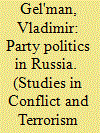

|
|
|
| 5 |
ID:
084629


|
|
|
|
|
| Publication |
2008.
|
| Summary/Abstract |
This article reports results of a survey on consumer perceptions about agroterrorism conducted in October and November of 2004. As part of a more general survey the authors asked respondents who the most likely perpetrator of an agroterrorist attack would be. Of American consumers, 47.52% believed that the most likely attack would come from a state-sponsored terrorist organization or government, 23.47% from a non-state-sponsored terrorist organization, and only 14.46% for domestic terrorism. The article argues that at the time of the survey these perceptions of risk were at odds, in terms of history and the conventional wisdom, which would place higher likelihoods first on domestic terrorism, then foreign non-state-sponsored terrorism, and then foreign state-sponsored terrorism. These results are explored in detail using a combination of cross tabulation and PROBIT analysis and find that a key variable (among others) in risk perception is political affiliation. The article then discusses the role of political communication via the Iraq War and Al Qaeda to explain the results.
|
|
|
|
|
|
|
|
|
|
|
|
|
|
|
|
| 6 |
ID:
084636
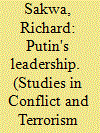

|
|
|
| 7 |
ID:
084637


|
|
|